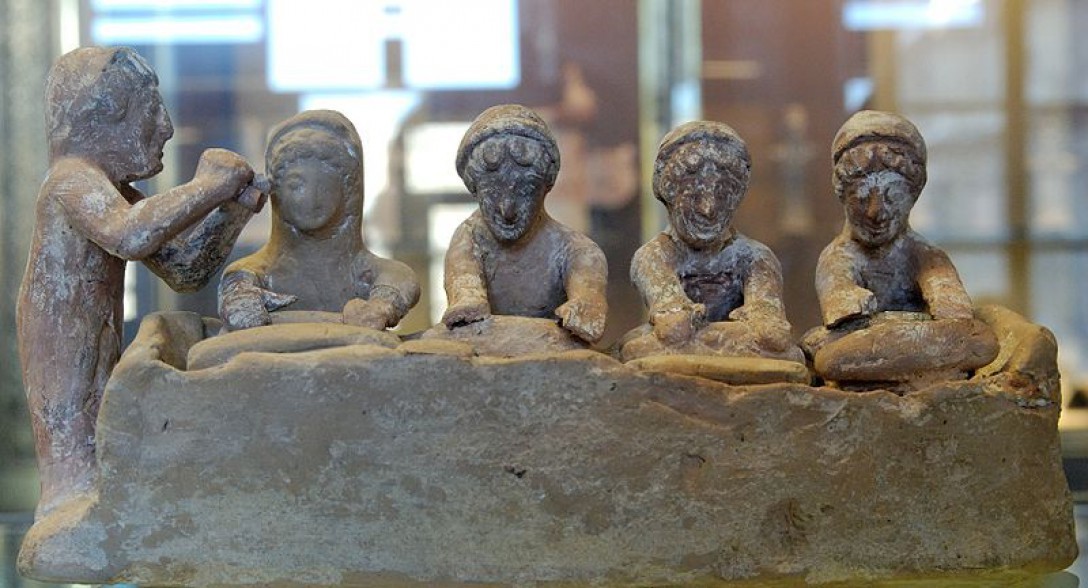To this very day there is a habit among islanders of chewing the seeds of melons and watermelons, after the fruits’ flesh have been consumed. Until late sixties, pepitada, a Jewish Sephardic milky – looking beverage made with melon’s seeds was also familiar to Greeks Christians of Rhodes, Chania (Crete) and Thessaloniki. It is worthy of notice that Chania had an old established Jewish Romaniotes community, not a Sephardic one. However, pepitada existed among Christians of Chania as tonic refreshment.
Pepitada is a Ladino word meaning ‘made from fruit seed’. The Sephardic Jews drink it when the fast of Yom Kippur is broken and before eating again. Apart from a tonic drink for braking fast, pepitada is a wonderful refreshment for hot days. Ιt is a pity that pepitada is not made anymore by Christian Greeks.
2 cups melon seeds. You can also use pumpkin seeds.
4 cups water
½ cup sugar orange flower or rose water or almond extract
Wash the seeds until they are cleaned. Drain well and sun dry them for 2-3 days. Spread them on a baking sheet and toast them until golden. Remove from the oven, let them cool and crush them in a mortar. Put them in a muslin bag, tie up tightly and place the bag in a glass pitcher filled with 4 cups water, for 36 hours. Keep the pitcher in the fridge. Every few hours give bag a few squeezes. The moisture from the bag will change the colour of the water. The last day, squeeze the bag tightly to remove all its liquid into the water. Set the mixture over low heat, add the sugar, stir and cook until the sugar is melted.
Flavour with the orange flower or rose water or almond extract. Serve pepitada chilled in small glasses.



Hi again,
Thanks for your reply.
I’m spanish and also jewish. Ladino term is a derogatory term. Our community do not use it never – we prefer “castellano medieval”, I mean, castilian medieval – and also spanish media try to avoid the term. Indeed “ladino” means as well the man than uses bad tricks to get what he wants and thus applied to jewish in clearly derogatory way. Jews before 1492 were distributed all along Spain, not only in one province – though was Andalucia, the south the most populated -. I know some spanish jews, specially out of Spain, use the term ladino. It is the same case of eskimos. Eskimo means “person who eats fish” but they prefer be called inuit. Regretfully when they talk about themselves, in order to be understood who they are, they name themselves eskimo cause saying “inuit” would confuse people.
The words Judezmo, Dzhudezmo come from the word “diezmo”, a kind of tax applied directly from the Kigs of Castilia or Aragon to the jewish community that was taking 1/10 (one tenth, cause diezmo means the tenth) of the benefits of jewish community. That’s also a derogatory name for us (nobody was to be name according the tax he/she pays).
Spain in hebrew is Sepharad and we are sephardies. We speak currently spanish and in old time we spoke ancient castilian, the same language that the people expelled us. We know sepharad communities out of Spain still speak about Ladino or Judeoespanyol, but that is because their history in some way stopped in 1492 and derogatory name became their only way to mention their roots. I keep some relationship with sephardies of Constantinoupolis and if they speak “ladino”, as themselves use to say, in one week in Spain or when I visit them easily turn to standard spanish. As I say to them many times, “you come to speak from Cervantes to speak like in 21st century”.
Xavier, In Greece pepitada was made with melon seeds and was drunk in both Sephardic and Christian communities.
Is the term “ladino” a derogatory nickname?
“Ladino, otherwise known as Judeo-Spanish, is the spoken and written Hispanic language of Jews of Spanish origin. Ladino did not become a specifically Jewish language until after the expulsion from Spain in 1492 – it was merely the language of their province. It is also known as Judezmo, Dzhudezmo, or Spaniolit..” http://www.sephardicstudies.org/quickladino.html
More about Ladino:
http://www.jewishvirtuallibrary.org/jsource/History/Ladino.html
I am spanish. The word “pepitada” means a collection of seeds. “Pepitas” are the seeds of melon and watermelon, mainly, but can be applied to the seeds of pumpkin. Jews of Thessaloniki were in origin from Spain and used spanish till the jewish community was massacred by the nazis. By the way, they spoke spanish, the same spanish spoken by christians in XV century. Right now still some communities of sephardies use same spanish, so for a standard spoken spanish it looks ancient or arcaic spanish. Do not use the term “ladino” cause is a derogatory nickname and they do not like at all.
thanks for the correction Mariana
You mean horchata. Spanish horchata is made by soaking tiger nuts, the Mexican version is made with rice, almonds, melon seeds etc. Have a look at Rachel’s Laudan post on horchata. Well, since pepitada is of Shephardic origin seems to be the Eastern Mediterranean cousin of horchata.
Although I am not very fond of retsina, next spring I will try to preserve some pine tips in vinegar and make pine liquor. And yes, I am really curious about their taste.
They make something similar in Mexico, originating in Spain, I believe. I expect it’s of Sephardic origin even it that’s not remembered.
Hey, what about a pine drink, Mariana? I saw you on Laurie’s spruce thread! 🙂 You can’t say Greeks don’t appreciate a nice hit of pine resin. Retsina!
Hi all,
yes, you should try pepitada, is very refreshing and tasty.
Very interesting. I’ve certainly through away enough melon seeds that the idea of using them for something . I’ll be interested to try this.
Never heard of this, either – sounds good!
never heard of this one – i would like to try it